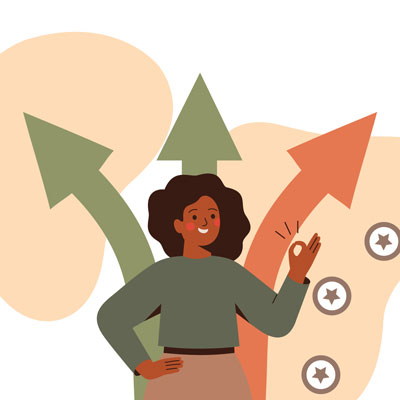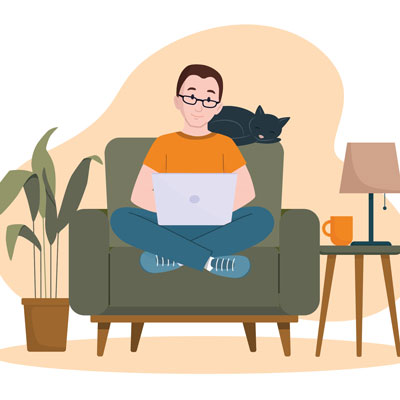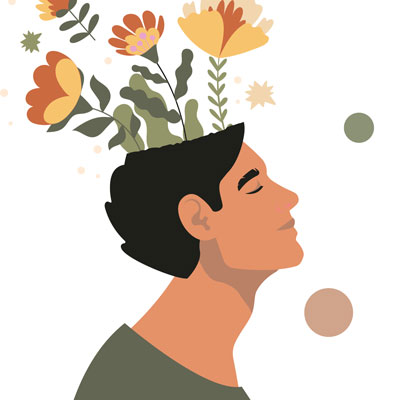The Great Awakening
The numbers have been staggering: In 2021, an average of 3.8 million American workers left their jobs every single month, according to the Bureau of Labor Statistics. Workers are quitting at twice the rate that they were just a decade ago, leading pundits to dub the trend “the Great Resignation.”
The reasons behind the trend are myriad: Many have left the workforce entirely to retire early, take care of family members, or to address their own health after two years of a grinding pandemic.
Others, including Grinnellians, have used this time as an opportunity to do wholesale reassessments of their careers. For many, these past two pandemic years helped illuminate not just the problems with the trajectories they were on, the years helped them see that another path was possible. In many cases, they’ve left stressful and unsatisfying jobs in favor of jobs that feel more aligned with their values and needs.
In other words, they haven’t simply been part of a great resignation; they’ve been part of a great awakening.
Mark Peltz, the Daniel ’77 and Patricia Jipp ’80 Finkelman Dean for Careers, Life, and Service, says that Grinnellians tend to be particularly adept at this type of career change. “A Grinnell education helps students identify, define, and clarify their values, strengths, and interests,” he says. “This self-knowledge and awareness is essential not only when considering professional opportunities, but also for gauging when it’s time for a change.”
In the five stories that follow, alumni share the complicated and important lessons of changing jobs and careers at this extraordinary moment.
Lesson 1
It’s Okay Not to Know Exactly What’s Next.
Meagan McKinstry ’16 seemed to have her life all mapped out. She’d wanted to be a lawyer since middle school. After Grinnell, she went to law school, secured internships linked to her interest in landlord and tenant law, and passed the bar. In late 2020, she launched her career as a staff attorney at the COVID Eviction Legal Help Project, part of the Volunteer Lawyers Project of the Boston Bar Association. She had executed her plan perfectly.
She was thrilled, at least initially. “For a while, it was just cool to be learning so much and to be getting paid for my work,” she says.
 But for all the things she knew she’d love about being a lawyer — reading, writing, and making a real difference to people on the margins of society — there were also parts that made her work feel untenable. For one thing, the stakes were enormous; no matter how hard she worked, failure meant that a client literally could end up homeless. Not only that, but the work was adversarial in a way that felt all-encompassing. “I recognize that there is conflict in any job, but litigation by its very nature centers on conflict,” she says. “While I could handle adversarial interactions, I didn’t want to. I’d prefer to work collaboratively rather than confrontationally.”
But for all the things she knew she’d love about being a lawyer — reading, writing, and making a real difference to people on the margins of society — there were also parts that made her work feel untenable. For one thing, the stakes were enormous; no matter how hard she worked, failure meant that a client literally could end up homeless. Not only that, but the work was adversarial in a way that felt all-encompassing. “I recognize that there is conflict in any job, but litigation by its very nature centers on conflict,” she says. “While I could handle adversarial interactions, I didn’t want to. I’d prefer to work collaboratively rather than confrontationally.”
By the fall of 2021 — as colleagues left the organization, her workload skyrocketed, and her mental health deteriorated — she knew she had to leave. And she did. She began seeing a therapist and has been exploring other options both within and beyond the legal profession.
For now, she says, she wants to remain compassionate to herself and make decisions that feel healthy as she continues to network and apply for jobs. “I’m trying not to get bogged down in feeling like I need to select the ‘perfect’ path,” she says.
While she’s the first to say she wouldn’t want to relive the past stressful year, she also acknowledges that without the acute stresses presented by COVID-19, she could have spent years in roles that were fundamentally a bad fit for her strengths and skills. “Without the stresses of the pandemic pushing me over the edge, I could have easily been one of those lawyers who stayed long-term and continued to tolerate conditions that weren’t a good fit for me,” she says. “As difficult as it [has been], I’m grateful that I had the extra push that forced me to confront reality now, instead of years down the road — or worse, never.”
Lesson 2
Your New Job Can Be Better — Without Being a Dream Job.
Benjamin Cantor-Stone ’07 had been working in collections management roles at museums and historical societies for more than a decade when COVID-19 hit. The pandemic wreaked havoc on his field — and helped Cantor-Stone realize it was time to find something new.
Even before COVID-19, jobs in his field had been tough to come by. He was often competing against more than 150 candidates when he applied for positions. Predictions that more a third of museums might shut their doors permanently in the wake of the pandemic made him even less optimistic about the future. More than that, he was tired of feeling lonely at his job. “I had spent so much time in the back rooms of a museum, basically by myself,” he says. “I missed having a community.”
 So when he learned that his brother was succeeding in a project management role, he was intrigued. Cantor-Stone did his research; jobs in the field were plentiful and forecasts for coming years looked promising. The roles would allow him to work more closely with lots of people. And the skill sets he brought to bear in his collections management role — a good mind for details and complex systems, for example — might be just what he needed in project management, too.
So when he learned that his brother was succeeding in a project management role, he was intrigued. Cantor-Stone did his research; jobs in the field were plentiful and forecasts for coming years looked promising. The roles would allow him to work more closely with lots of people. And the skill sets he brought to bear in his collections management role — a good mind for details and complex systems, for example — might be just what he needed in project management, too.
To prepare, he spent a year getting a certificate in project management from a community college. Recently, he landed a job at a firm that designs, manufactures, and installs cabinets and interior trim. “I was able to convince them that, despite my unconventional background, I was worth taking a chance on,” he says.
Cantor-Stone loves a lot about his new job. He enjoys being a part of a team, having more job security, and knowing that plenty of options are available to him moving forward. “Is it a perfect fit? Not necessarily,” he acknowledges. “But it is a comfort to know that I don’t have to look for work. That gives me peace of mind.”
“In academia, they call it ‘publish or perish,’ and it’s really high-stress. If I wasn’t working, I felt guilty. I hadn’t taken a whole Thanksgiving weekend off in 15 years, because I was always grading.”
– Kate Anderson ’02
Lesson 3
Finding Your “Dream Job” Might Also Be About Building Your “Dream Life.”
Kate Anderson ’02 had been thinking for years about leaving the academic world.
While she’d been productive in her decade as an assistant professor in the Tepper School of Business at Carnegie Mellon University and as a visiting professor in the Department of Informatics and Networked Systems at the University of Pittsburgh, the lifestyle had been a grind. “In academia, they call it ‘publish or perish,’ and it’s really high stress,” she says. “If I wasn’t working, I felt guilty. I hadn’t taken a whole Thanksgiving weekend off in 15 years, because I was always grading.”
She knew she had a job that many envied, but she also knew she wasn’t happy in it. And in 2020, when the budget for her position as a visiting professor dried up as the pandemic raged, she decided to make a shift. She was ready to close the door on the academic world for good.
She ultimately landed a role as a senior methodologist at Interos, a company that helps organizations assess their supply-chain risks. Instead of studying labor market networks, which she did as an academic researcher, she now analyzes supply-chain networks. While she enjoys the role and works hard at it when she’s on the clock, she also loves the life she can build beyond her job. “I pick up my kids every day at 3. I built a woodworking workshop in my basement because now I have time to do that,” she says.
And for the first Thanksgiving in her new job, she took the whole weekend off. “It was a revelation,” she says.
Lesson 4
You Can Mourn Losses Even as You Make Positive Changes.
 In January 2020, after 11 years of working at the Irving S. Gilmore Music Library at Yale University, Emily Ferrigno DiLeo ’97 made the leap to a new role with a pop music sound archive at a state university in Ohio. It was a big move; to take the job, she moved her whole family — her husband and young twins — hundreds of miles across the country.
In January 2020, after 11 years of working at the Irving S. Gilmore Music Library at Yale University, Emily Ferrigno DiLeo ’97 made the leap to a new role with a pop music sound archive at a state university in Ohio. It was a big move; to take the job, she moved her whole family — her husband and young twins — hundreds of miles across the country.
To say that timing was not exactly fortuitous was an understatement.
Within six weeks, her job went remote, the preschool her kids attended closed its doors, and her efforts to forge new friendships got put on hold. And she realized that the workplace she’d uprooted her entire life for was toxic. “I couldn’t hold all those things,” she says. “It was breaking me. I just couldn’t do it,” she says. Something needed to change.
Her next move? “I did things the typical ‘me’ way,” she says, which meant planning meticulously for her transition. She gathered with a handful of her colleagues to discuss the book Designing Your Life. She hired a career coach, she began networking, and she stashed as much money as she could into a savings account.
Ultimately, she left the academic library world in favor of a remote contract position in user experience research with the media company Thomson Reuters. The role allows her to use the research skills she built in her previous positions while tripling her previous academic salary. “I can hire a cleaner,” she says with no small amount of joy. “I can pay for the expensive preschool that my kids go to, since the other one closed.”
Still, she admits that the transition, while positive in many ways, hasn’t always been easy. “Academics feel passionately about the thing they study; it’s personal — it’s your identity. So if my identity isn’t pop music, what is it?” She misses campus, too — a space and community that’s possible to build a life around.
Even if all the pieces haven’t fallen into place yet, she more fully understands what she values and what she wants. And she sees more opportunities on the horizon. Remote work offers the possibility of moving closer to her sister and mom in Dallas, and side gigs might fill gaps she feels in her sense of identity.
There may be no perfect job or perfect time to change, but that doesn’t mean you need to stand still, says DiLeo. “If you want to make a pivot,” she says, “just start pivoting.”
“If you want to make a pivot, just start pivoting.”
– Emily Ferrigno Dileo ’97
Lesson 5
You Can Change Your Priorities — Then Pursue Them With Joy.
Over the course of a thriving career in industry — highlights included developing the MIME protocol that allows users to send email attachments, launching successful startups, and running a research program at IBM — Nathaniel Borenstein ’80 and D.Sc. ’13 focused on any number of different things: impact, intellectual challenge, money.
But a brutal and life-altering 2020 changed everything. His oldest daughter, Shana, died unexpectedly. His son-in-law, Mike, died after fighting brain cancer for 13 years. And he faced a massive, high-risk heart surgery of his own. “My family was swamped in grief,” he says.
Borenstein himself was so uncertain about the outcome of his potential surgery that he put his affairs in order. But when he joined a clinical trial, he had what he calls “a medical miracle.” Not only did surgery become unnecessary; it left him feeling healthier than he’d ever felt in his life. “It felt like I had been given a second chance,” he says.
 While he could have retired early, he decided instead to seek a new job that allowed him to focus on something new: fun. He recently joined the University of Michigan’s School of Information, where he’ll teach, work with graduate students, and finish a book he’s been working on.
While he could have retired early, he decided instead to seek a new job that allowed him to focus on something new: fun. He recently joined the University of Michigan’s School of Information, where he’ll teach, work with graduate students, and finish a book he’s been working on.
As an extrovert, he’s thrilled about the opportunities to work with young people, rather than sitting behind a screen. He sees opportunities to make the most of the skills he’s gained over nearly a half-century of work by mentoring and guiding the next generation of innovators.
Without economic pressures or worries about building a career, he can enjoy the role in a way that has often been difficult in the past. “The world seems almost as full of possibilities for me now as it did when I graduated from Grinnell in 1980,” he says. “For the first time in years, I feel like my best days may still be ahead of me.”

